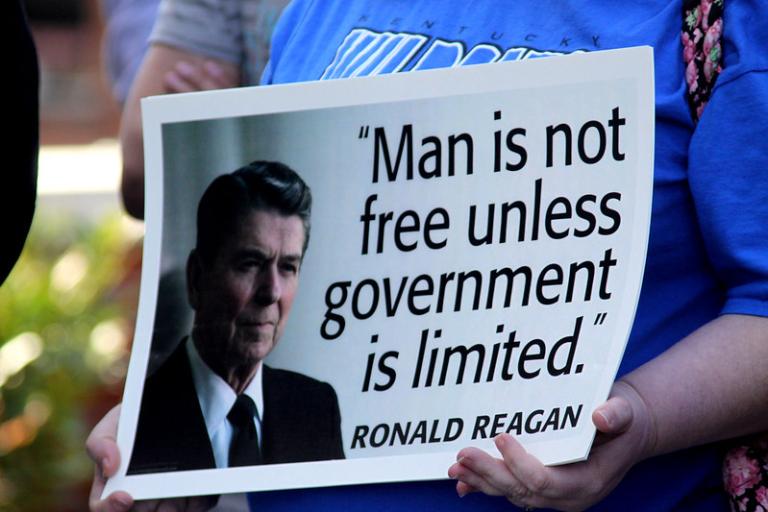According to conventional conservative wisdom, big government is a threat to freedom, while small government allows individual liberty to flourish. Libertarians are often leery of government altogether, while anarchists would love to have no government at all.
William A. Galston of the Wall Street Journal, though, takes a different perspective. He argues, in the words of his op-ed piece on the topic, that There’s No Freedom Without Government. The deck states his basic reasoning: “Natural rights don’t mean much without a mechanism for protecting them.”
The column is behind a paywall, but here is the gist of it:
According to the Declaration of Independence, individuals are endowed with natural rights. But it’s one thing to have inherent rights and quite another for those rights to be respected and protected. Individuals can get away with violating others’ rights if there isn’t an enforcement power to stop them. That’s why government is needed—to “secure” our ability to exercise our rights—and it must be strong enough to do so. Government can go too far, and citizens must resist it—with their voices and votes, and through the courts—when it overreaches. Conversely, a government too weak to secure our rights is not more but less compatible with freedom.
This is a version of a conversation I once had with my politically liberal brother. We worked it out that conservatives want to protect citizens from their government. Whereas liberals want the government to protect citizens from the private sector, such as big business and exploitive corporations.
I think Galston reminds us conservative Christians that governments with their associated vocations are gifts of God, by means of which which He protects us from evildoers (Romans 13; 1 Peter 2:13). Soon after St. Peter tells us to be subject to every human institution, including the Emperor and governors who punish those who do evil and praise those who do good, he brings freedom into it: “Live as people who are free, not using your freedom as a cover-up for evil, but living as servants of God” (1 Peter 2:16).
So governments are not intrinsically hostile to freedom, and they are indeed necessary to establish social order, without which freedom is indeed impossible.
But there are a few considerations I think Galston is missing. Today we are indeed facing threats to our freedom from the private sector: Speech codes, cancellations, censorship, religious bigotry, people losing their jobs because of their beliefs or what they post online, etc., etc. But we are told that the Bill of Rights only applies to government actions. The government can’t infringe on anyone’s freedom of speech or religion, but the private sector can. But if government exists to “secure” these rights, as Galston and the Declaration of Independence say, why isn’t it cracking down on universities, corporations, social media mobs, and individuals who suppress our freedoms?
Furthermore, the Bill of Rights does specifically restrict the power of government to violate our freedoms. In the words of the First Amendment, “Congress shall make no law respecting an establishment of religion, or prohibiting the free exercise thereof; or abridging the freedom of speech, or of the press; or the right of the people peaceably to assemble, and to petition the government for a redress of grievances.”
Why does it do that, if governments are by nature protective of freedom? And we can ask, who have been the biggest suppressions of freedom? Who but authoritarian governments?
Private citizens and corporations can indeed restrict people’s freedoms, as they are doing today. But their power is much less than the power of a government, which can take people’s property, throw them into prison, and even put them to death. (Some states have eliminated the death penalty, but the federal government has not.) For that reason, government is potentially a bigger threat to freedom than the private sector.
The genius of “liberal” democracy–that is to say democracies that enshrine liberty–which is so much maligned today, is that not only the people but the government itself is brought under the law. Not all democracies have been liberal democracies. For example, the democratically elected dictatorships of ancient Greece or the democratic Reign of Terror in the French Revolution. A good government will indeed protect its citizens’ freedoms, which will include limiting its own power.
Photo: Ronald Reagan Sign by Gage Skidmore via Flickr, CC BY-SA 2.0












